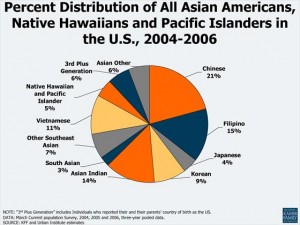
With the re-launch of my blog late last month, I’m back on my Twitter feed (@Reappropriate). Earlier this week, @aamodelminority (founder and owner of ModelMinority.com) tweeted an article that had been posted on their main site back in 2010, reporting a waning usage of the term ‘Asian American’. Writes author Stephanie Magagini:
As Sacramento’s growing Asian immigrant communities celebrated Sunday’s Pacific Rim Street Fest, a growing number note that Asian American isn’t a race and said they choose to identify by their ethnicity.
Robbie Mae Lopez and her family came downtown to enjoy more than 15 Asian cultures represented – but don’t call her Asian American.
“I’m full-blooded Filipino American,” said Mae Lopez, 27, of West Sacramento. “Asian American is kind of a loose term. I think being Filipino American is a full-blown identity crisis itself. We were overrun by the Japanese, Spanish … .”
As the race question on the U.S. census form has expanded to 15 categories and write-in options – giving Americans the right to check as many boxes as they want – fewer are embracing the term Asian American.
The tension over the term “Asian American” is nothing new in the Asian/Pacific Islander American (APIA) community. Ever since the term first gained popularity in the late 60’s, Asian Americans of all different ethnicities have struggled to reconcile their own identities with this umbrella term.
And I’ve always wondered: why?
Unlike other racial groups (notably the African American), the ties that bind together the Asian American community are almost deliberately artificial. We have no shared history of slavery in this country. The umbrella term of Asian America was formulated to create a political bloc between disparate peoples based upon an admittedly vague (almost nominal) common narrative: shared physical traits and similar political interests. It was a revolutionary act, built to contrast America’s history of emphasizing the differences between Asian immigrants in order to undermine alliances between Asian ethnic groups and build political power. But, in some ways, the term “Asian American” has always felt like a forced facade born of political convenience. Which, to be fair, is exactly what it is.
Thus, is there any wonder that Asian Americans feel this terms homogenizes our community, and hides the unique ethnic cultures, languages, and histories enjoyed by individual Asian Americans of different ethnicities? Magagini describes several Asian Americans who, in the 2010 Census, shunned the term “Asian American” . These Asian Americans felt a lack of identification with other Asian American ethnic groups, and an overall dissatisfaction with the term “Asian American”; they complained that the phrase “Asian American” is an imperfect fit. And so, they identify themselves solely by their individual ethnicities.
“Asian American is a very broad term. I usually identify as Chinese,” [Tiffany Tsui, Miss Asia Sacremento] said, adding that many Asian Americans “struggle to really stand out in American society and be true to our culture.”
On the flip side, community activists complain that acknowledging Asian ethnicities within the Asian American community only works against the struggle for political solidarity:
“To break ethnicity down into the various subgroups works against the collective voice the greater community needs.” [Alice Wong, community activist] said.
But, where’s the rule that says you can only have one self-identity? Why are we setting up Asian American and Chinese American as mutually exclusive?
I am Asian American. I am Chinese American. I am Canadian. I am ABC and CBC and Taiwanese and Cantonese and Shanghainese. I am a woman and a woman of colour and a feminist and twenty-something and college-educated and a Democrat and a Progressive and a liberal and a scientist and a gamer and a geek and a grrl and a blogger and a gym rat. All of these terms describe me, but none of them, in isolation, define me. None of these terms are a perfect fit to describe the many facets of me, but, in combination, these identities complement one another to build a picture of who I am.
People aren’t one-dimensional. The terms we use to identify ourselves shouldn’t have to be, either.
